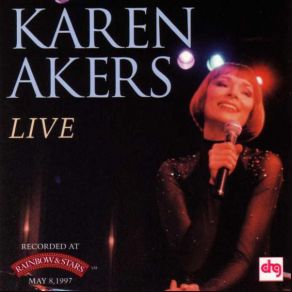Live from Rainbow and Stars
Download links and information about Live from Rainbow and Stars by Karen Akers. This album was released in 1997 and it belongs to Theatre/Soundtrack genres. It contains 15 tracks with total duration of 01:05:15 minutes.

|
|
|---|---|
| Artist: | Karen Akers |
| Release date: | 1997 |
| Genre: | Theatre/Soundtrack |
| Tracks: | 15 |
| Duration: | 01:05:15 |
| Buy it NOW at: | |
| Buy on iTunes $9.99 | |
Tracks
[Edit]| No. | Title | Length |
|---|---|---|
| 1. | Fun to Be Fooled/How Little We Know | 6:04 |
| 2. | Planes | 2:44 |
| 3. | How Do You Say Auf Wiedersehen? | 3:20 |
| 4. | Newt -- Torch Song I | 3:30 |
| 5. | There's a Lull In My Life/I Don't Want to Walk Without You/My Melanchol | 8:19 |
| 6. | Whatever Happened to Melody! | 3:31 |
| 7. | Strom -- Torch Song II | 2:59 |
| 8. | Ricorda/You Don't Have to Say You Love Me | 6:23 |
| 9. | Rush -- Torch Song III | 2:32 |
| 10. | Laughing Matters | 4:27 |
| 11. | Chanson | 4:54 |
| 12. | It's Time for a Love Song/E L'Amore Che Fa Amare? | 4:27 |
| 13. | My Brother Lived In San Francisco | 3:30 |
| 14. | Around the World | 5:08 |
| 15. | Non, Je Ne Regrette Rien | 3:27 |
Details
[Edit]Karen Akers is a nightclub entertainer, and because of that she is best heard before a small, appreciative audience rather than singing in a recording studio. After returning to Cabaret Records for her fifth album, the all-French collection Under Paris Skies, she shifts back to DRG for her sixth, recorded at Rainbow & Stars, the cabaret adjoining the Rainbow Room at the top of Rockefeller Center in New York. The live format allows her to add an aspect to her performance that would be harder to bring off alone in the studio: humor! Borrowing a series of comic songs from the show When Pigs Fly, she addresses mocking endearments to three pillars of the political right with curious first names, Newt, Strom, and Rush. The songs are even funnier when delivered, as intended, by a gay man, but Akers' typically straightforward approach works, too, and the sprinkling of the numbers through the set gives it structure and creates anticipation. In between, Akers puts together another winning collection of love songs selected by her individual criteria. She is attracted to songs about travel and long-distance love (Peter Allen and Carole Bayer Sager's "Planes"), which express her own transcontinental existence. She is as interested in resurrecting a 1960s pop chestnut like "You Don't Have to Say You Love Me" as she is in rediscovering a lost show tune from an undeserved flop musical (Burton Lane and Alan Jay Lerner's "It's Time for a Love Song" from Carmelina). And she wants to sing in French as well as English, with another language, such as Italian, thrown in for good measure. This finds her tackling "Non, Je Ne Regrette Rien" as a closing song, a real risk given its association with Edith Piaf. She doesn't best Piaf, of course, but she does give the song a separate life, which is good for it and for her.